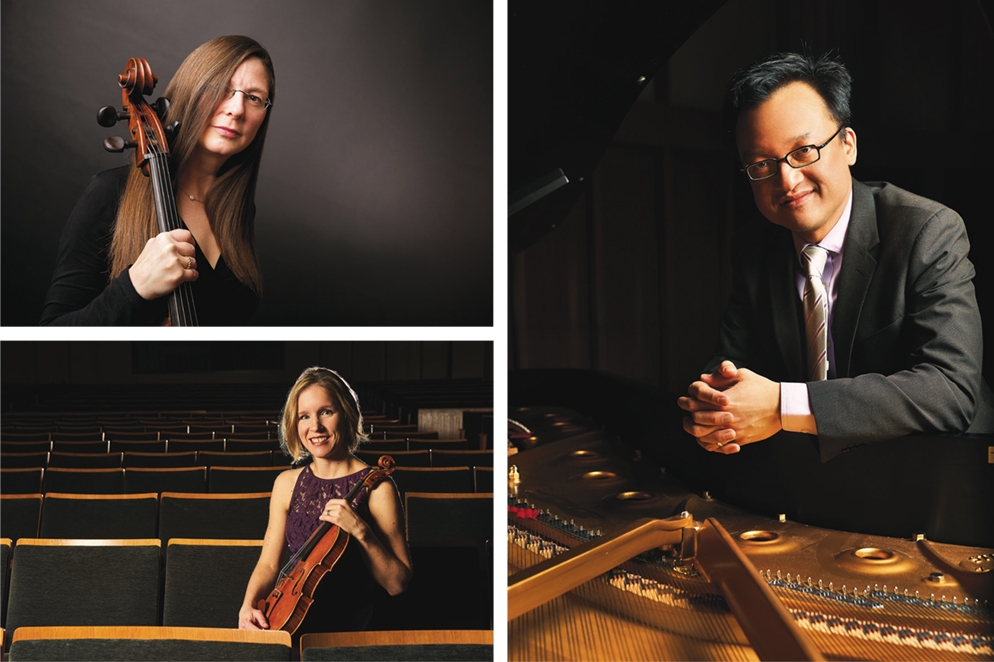Closing out the season, Holland Symphony Orchestra and three local musicians are taking on works by three of classical music’s most well-known composers: Mozart, Beethoven and Tchaikovsky.
This Triple Threat includes Beethoven’s Triple Concerto in C major, Op.56, featuring Andrew Le on piano, Jennifer Walvoord on violin and Alicia Eppinga on cello. The program also includes Mozart’s Overture from Abduction from Seraglio, K.384, and Tchaikovsky’s Symphony No.6 in B minor.
Triple Concerto, which premiered in 1808, was the first piece of its kind to be written for this combination of instruments. Known as a piano trio, it’s a work not usually programmed due to the fact there are three soloists at once, Walvoord said.
Le and Walvoord are husband and wife and perform as a duo, mostly playing sonatas, and with Eppinga fairly often as a trio.
“To get to perform with an orchestra — together! — is really a unique experience and one that we haven’t had before,” Walvoord said of performing with Le.
Beethoven kept his thematic material simple and treats the trio as a combined soloist. He gives the piano the lightest part, awarding the cello the starring role and utilizing its powerful top register. The violin adds support to the cello part and embellishes many of the themes.
“It is really a concerto like no other,” said Walvoord, an accomplished violinist who also serves as HSO’s director of marketing. “Beethoven does a masterful job in this piece of treating it as a ‘piano trio’ solo, not just three separate people.”
They are “thrilled” to perform Beethoven’s Triple Concerto with HSO, because the three musicians have never played it together. Walvoord, also concertmaster of West Michigan Symphony, did play the concerto with WMS a few years ago.
Le is an associate professor of piano and head of the keyboard area at Hope College. He and Walvoord serve as the artistic directors of the Chamber Music Festival of Saugatuck.
Eppinga has been a member of the Grand Rapids Symphony since 1989, appointed principal cello in 2011.
“It’s definitely a treat for us,” Walvoord said. “Alicia and I have both played this piece before, but Drew hasn’t and he is particularly relishing the experience. There is something magical about the soaring expansiveness of this piece, and we hope to thoroughly convey this feeling when we perform it.”
One of Mozart’s most joyful compositions, The Abduction from the Seraglio, premiered in 1782. He set his first Viennese opera to a libretto about captives who try to escape from a Turkish harem. At the time, composers captured exotic sounds of “Turkish music” with piccolo and various percussion instruments, including snare drum, bass drum, cymbals and triangle.
Mozart’s Overture from Abduction from Seraglio, K.384 alternates loud and soft, with lively Turkish sounds in the loud passages, of which he wrote to his father, “I don’t believe anyone could fall asleep, even if he hadn’t slept at all the whole night before.”
Another concert highlight is Tchaikovsky’s Symphony No.6 in B minor. Tchaikovsky conducted the premiere performance of his sixth symphony nine days before his death, which scholars often attribute to suicide.
Tchaikovsky wrote to his nephew that he frequently shed tears while mentally composing the work, and after finishing it: “I consider this symphony the best thing I have ever done. In any case, it is the most deeply felt. And I love it as I have never loved any of my compositions.”
He had the symphony’s format, described as unusual, planned from the start: first movement, all impulse, confidence; second movement, love; third movement, disappointment; and the fourth movement ends with a dying away.
Tchaikovsky later changed the name to Pathétique, connoting deep and passionate emotions. It’s a performance Walvoord said people will not want to miss.
“Tchaikovsky’s last symphony is truly a masterpiece with all of the emotion, passion and excitement that one could want in a piece,” she said. “It will be a truly wonderful way to finish off the concert and the season.”





